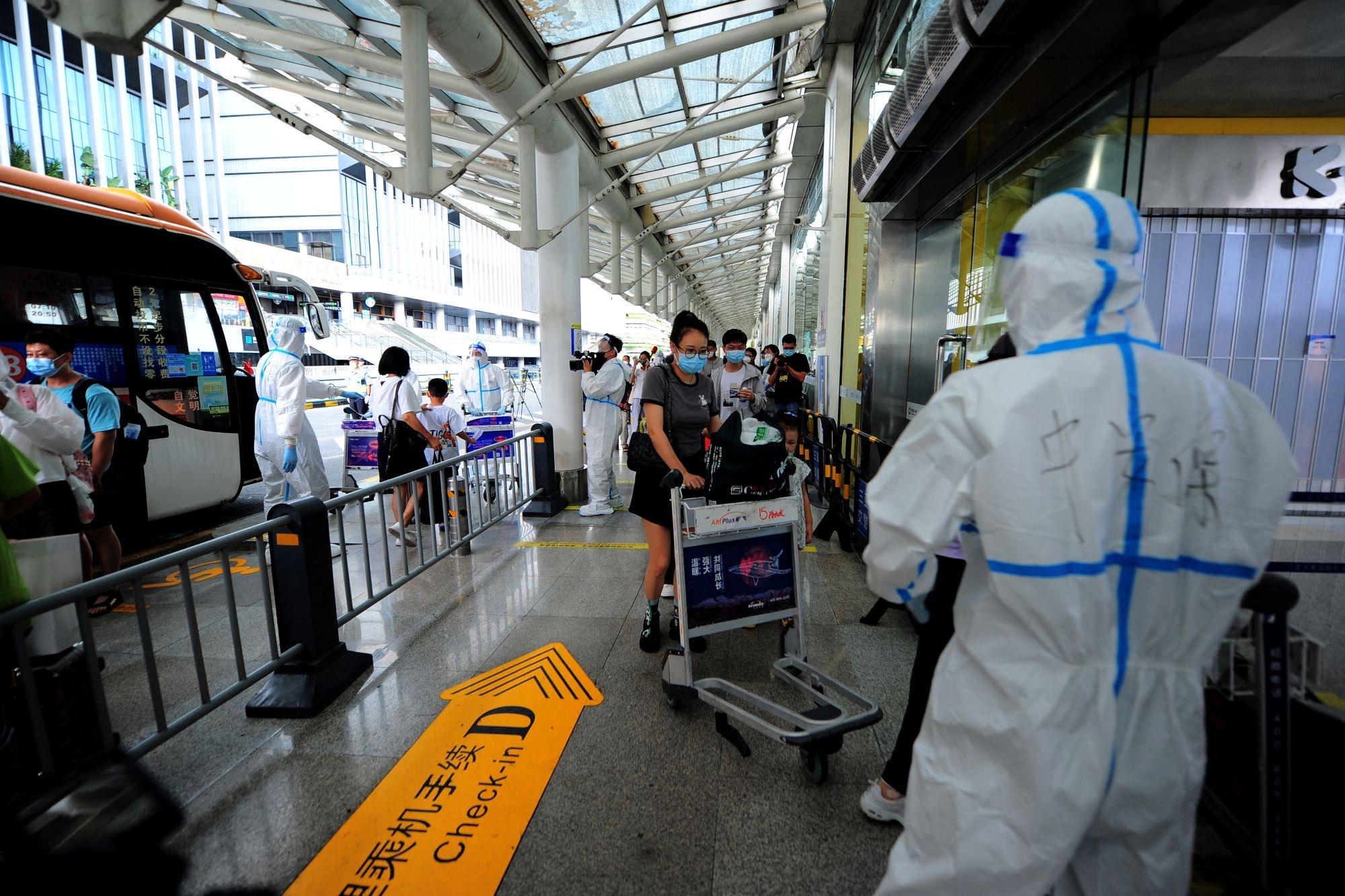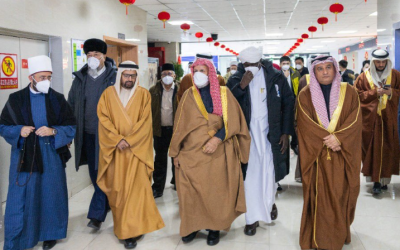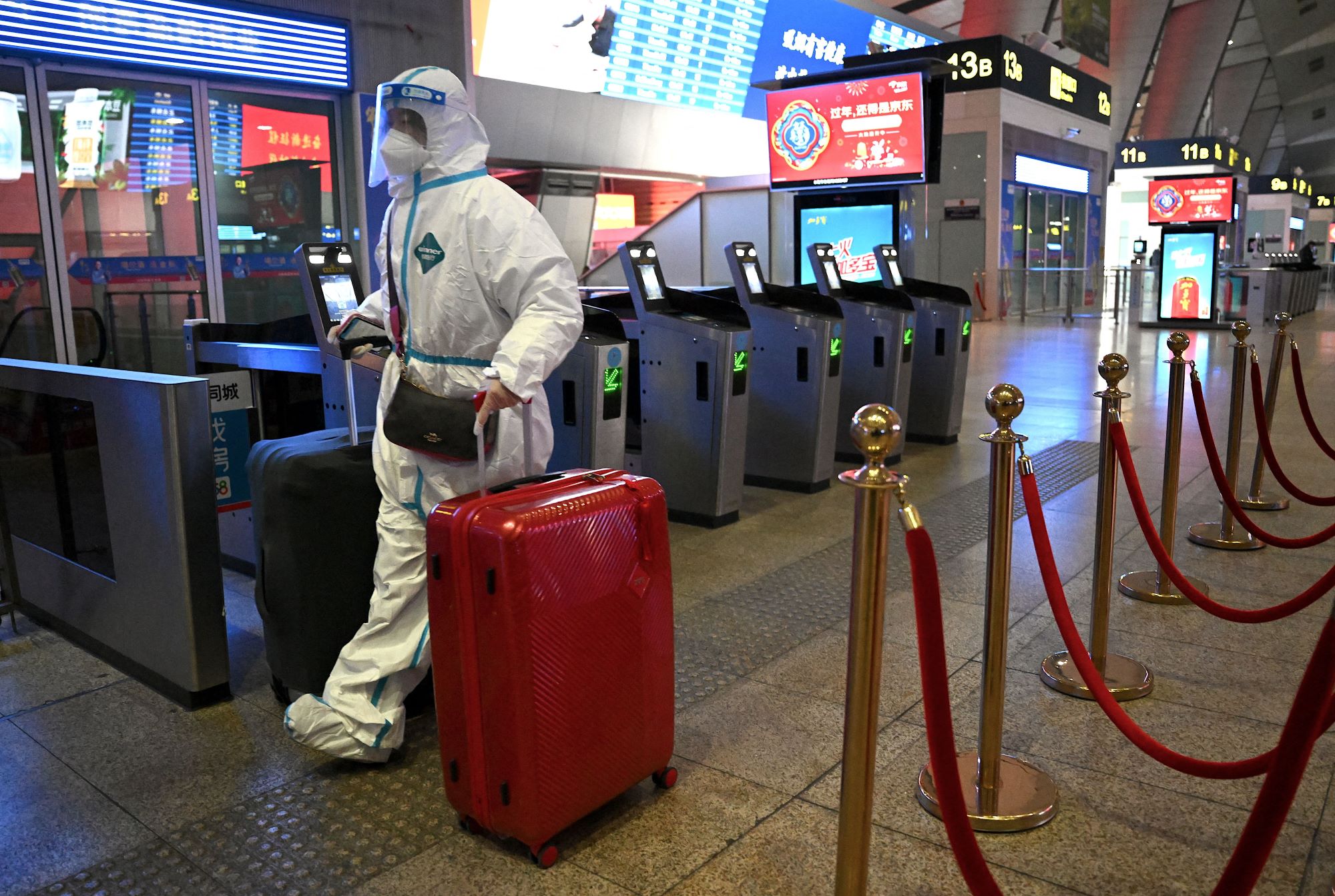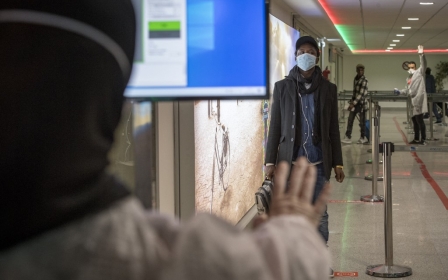Moroccan students return to China as zero Covid policies end

With China all but abandoning its "zero Covid" health policy of lockdowns and travel bans to tackle the Covid-19 pandemic, a number countries have responded by restricting travel from China or imposing tough new entry requirements.
Morocco has arguably taken the most aggressive response, blocking all incoming travel from China since 3 January.
Despite this, a key segment of the kingdom’s population is benefiting from the end of China's lockdown - the growing number of Moroccans heading to China to start or complete their studies.
'Covid has affected people of all ages and countries, but foreign students in China have been affected the most academically'
- Mohamed Amine Akhayat, student
Mohamed Amine Akhayat, a 21-year-old from Casablanca studying computer science at Hangzhou Dianzi University, arrived in China in December. He had been waiting to go back since 2020, when a Chinese travel ban stranded him in Morocco during his winter break, a situation familiar to many of China's Moroccan students.
Back in the Chinese city of Hangzhou after almost three years, Akhayat said he felt anxiety, excitement and relief.
New MEE newsletter: Jerusalem Dispatch
Sign up to get the latest insights and analysis on Israel-Palestine, alongside Turkey Unpacked and other MEE newsletters
"Covid has affected people of all ages and countries, but foreign students in China have been affected the most academically," Akhayat told Middle East Eye.
"Imagine the amount of instant noodles I've eaten awaiting the day I could taste authentic ones."
China’s unique appeal
Most Moroccan students who go overseas choose universities in Europe, according to data from the website Erudera. But the low cost and high rankings of China's academic institutions have made for strong competition.
"China undeniably provides decent to excellent degree programmes for reasonable tuition fees, on top of several scholarships," said Akhayat, who himself received a Zhejiang provincial government scholarship.
Through a vast arsenal of grants bankrolled by public universities, local governments and the education ministry, Chinese officials aim to attract more Moroccan students and strengthen China's reputation in the Global South.
"Chinese scholarships for Moroccan students are part of the larger Chinese goal of diplomatic engagement with the African continent," said Deborah Brautigam, director of the China Africa Research Initiative at Johns Hopkins University.
This campaign has found a receptive audience in Morocco. Morocco World News reported that over 500 Moroccans applied for Chinese scholarships for the 2021-2022 academic year.
They join students like Manal Manam, an 18-year-old from the port city of Mohammedia who arrived in China last month. The Chinese Scholarship Council, an arm of the education ministry, is funding her bachelor's degree in international economics at Jiaying University, in the Chinese city of Meizhou, through the China-Africa Friendship Program.
"It's a really good experience," Manam told MEE. "Unlike Europe, the locals are welcoming and easy to interact with, and it's really affordable to live comfortably here."
A majority of young Moroccans share her enthusiasm for China. The results of a poll released this month by the Arab Barometer, a research group, found that 64 percent of Moroccan youth had "favourable views of China".
China's status as a rising superpower resonates among Moroccans eager to look beyond the western world.
"I picked China because it's the New World," said Yosra Elatouri, who received a grant from the Chinese Scholarship Council to study mechanical engineering at Zhejiang University.
Morocco's underinvestment in higher education may also play a role. The Arab Barometer survey found that 74 percent of Moroccans felt "dissatisfied" with the kingdom's educational system.
"China gives students a chance, unlike Morocco," said Basma Benlahsen, a student of mechanical engineering at Northwestern Polytechnical University in the Chinese city of Xian. "They don't judge you by your marks. They help you achieve your goals."
The chaos of zero-Covid
Chinese officials seem to have undone some of this goodwill through their Covid-19 border controls, which locked many Moroccans out of China for years.
Moroccan students interviewed by MEE cited a number of frustrations with zero-Covid, including ineffective approaches to distance education, missed opportunities for internships, and the difficulty of keeping up with China's ever-changing health policies.
A 2020 Change.org petition by "Moroccan students who are enrolling in Chinese universities" criticised "the quality of online teaching" as well as "technical problems, the lack of communication and the focusing on theory rather than practice". The petition, which called on Chinese and Moroccan officials to "help Moroccans go to China", garnered 284 signatures.
"China has always been strict when it comes to Covid - too strict, I might say," said Akram Izimi, a student of computer science at China Jiliang University who arrived in Hangzhou in November. "Because of that, the country is suffering a surge in Covid cases after the relaxation of restrictions."
China's abrupt decision to do away with zero Covid - a concession to anti-lockdown protesters, some of them Chinese students - has expedited Moroccans' return. But the abandonment of China's signature health policy is also allowing Covid-19 to spread unchecked.
"A lot of services are delayed because of the staff being contaminated," said Manam, the student at Jiaying University. "Technically speaking, China should have planned more because almost everyone has got sick now."
Some estimates suggest that China's latest Covid-19 wave could cause as many as a million deaths, inspiring a range of countries to restrict travel from there. Morocco, which instituted the Arab world's most aggressive Covid-19 travel bans in 2020 and 2021, is leading the pack.
'The Chinese government is unlikely to punish another developing country. This is not something that will rise to the level of a diplomatic incident'
- Deborah Brautigam, John Hopkins University
"Morocco not allowing travellers from China seems a bit illogical," said Izimi. "They should just require PCR tests from incoming travellers. Now Morocco is risking the return of other students because China could do the same to Morocco."
At a news conference earlier this month, Mao Ning, a spokesman for China's foreign ministry, threatened "countermeasures based on the principle of reciprocity" against countries that limit entry by its nationals.
Nevertheless, Chinese officials have refrained from singling out Morocco, and the chances of Chinese retaliation against the kingdom appear low.
"The Chinese government is unlikely to punish another developing country," said Brautigam, the Johns Hopkins scholar. "This is a small annoyance, not something that will rise to the level of a diplomatic incident."
Many Moroccan students, meanwhile, have learned to live with China's evolving health policies.
"China is doing its best to control the situation," said Walid Sami, a student of computer science enrolled at Nanjing University of Posts and Telecommunications.
Still in Morocco, Sami plans to go back to China in September and is taking classes online in the meantime.
"Even if I had stayed in China, I would have been studying online in my room, which is a waste of money and time," he told MEE.
Competition for Moroccan students
Other Moroccan students have had enough, and alternatives to China abound.
Sifeddine Bakoussi was pursuing a bachelor's degree in biotechnology at Zhejiang Normal University in 2020 when Covid-19 trapped him in Morocco on his vacation.
"I didn't finish the degree online because a lot of the courses were practical and needed my presence in a lab with expensive equipment," said Bakoussi.
'I was very much intimidated by the Chinese language and my lack of knowledge of the culture and way of life'
- Ghita Benboubker, student
Frustrated by China's health policies, he disenrolled from his Chinese university and is exploring the possibility of attending an American academic institution.
Erudera ranked the United States as the second-most-popular overseas destination for Moroccan students, after France.
At the same time, China's East Asian rivals are leveraging their own mix of scholarships and soft power to entice Moroccans.
Ghita Benboubker, a 24-year-old from Fes, considered China for her studies but ultimately opted for South Korea, inspired in part by her fascination with the country's language and a love of K-dramas. China's pop culture lacked the same pull.
"I was very much intimidated by the Chinese language and my lack of knowledge of the culture and way of life," she told MEE.
Benboubker is pursuing a master's degree in data science at Seoul National University thanks to the Global Korea Scholarship, an initiative by South Korea's education ministry that has attracted a sizable cohort of Moroccan students.
Japan, whose promotion of anime has encouraged a cult following in the Arab world, is likewise becoming popular with Moroccans going abroad for higher education.
Imane El Messaoudi, a fan of manga growing up in Marrakesh, received a grant from the Japan International Cooperation Agency to study artificial intelligence at Tokai University in Tokyo.
"When I got the scholarship, it was the perfect opportunity to live in Japan and experience what I've always been passionate about," said El Messaoudi.
"I never thought about studying in China."
As China's Moroccan students deal with the aftermath of the country's travel bans and the demise of zero-Covid, the appeal of options like Japan, South Korea and the United States may only increase.
"China could have done a lot to bring us back," said Bakoussi, the former Zhejiang Normal University student. "We were ready to take the test and stay in quarantine at our expense. But China didn't accept that."
Middle East Eye delivers independent and unrivalled coverage and analysis of the Middle East, North Africa and beyond. To learn more about republishing this content and the associated fees, please fill out this form. More about MEE can be found here.







